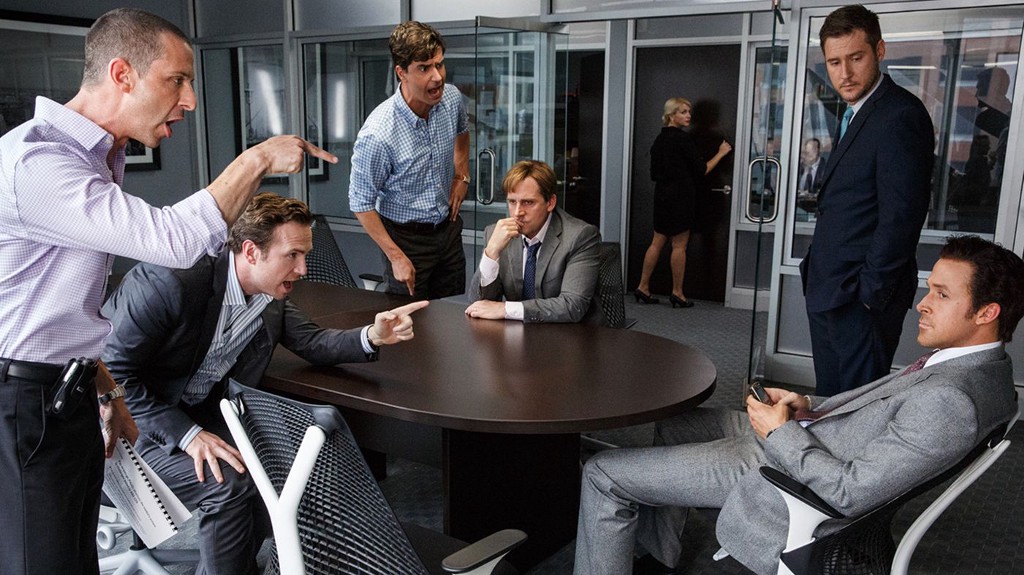Hollywood Enter-splains The Financial Crisis
Do We Need Pop Culture To Give Us Econ 101?

The Times points out there there is “a booming market for art that imitates life” in regards to our nation’s recent economic meltdown, which is to say that Hollywood has gotten in the habit of what I like to call “enter-splaining.” (You know, a combination of “entertaining” and “explaining.”) Some high-profile recent movies about the financial crisis from include Margin Call, Wall Street: Money Never Sleeps, and Inside Job, as well as this year’s 99 Homes (less directly) and Adam McKay’s Oscar-nominated The Big Short (much more directly). And there are plenty of others in the pipeline.
Entertainment industry executives and publishers say there is a growing audience for movies, plays, television shows and novels that address the misdeeds and systemic failures that brought the economy to the edge of collapse eight years ago.
“The Big Short,” which is based on a nonfiction best seller by Michael Lewis, has earned more than $100 million at the box office worldwide. Accordingly, there are movies in development with titles that pretty much give away their plots: “Smoke and Mirrors,” “All We Had” and “Straight to Hell.”
“These projects are not operating in a vacuum,” said Len Amato, president of HBO Films. HBO has a movie about Bernard L. Madoff coming out in 2017. ABC’s two-part mini-series “Madoff” aired last week.
Hollywood has always vacillated between seeing itself as an escapism factory and making earnest, sometimes clunky, attempts at addressing social issues. During the Great Depression, it provided audiences with a thousand screwball comedies about rich people, from The Thin Man to Holiday, as well as some more realist fare like King Vidor’s astonishing The Crowd and the Busby Berkeley musical Gold Diggers of 1933, featuring the classic, rueful & ironic song “We’re In The Money.”
But even in those more socially conscious pictures, it focused far less on the root causes of the Depression and more on the Depression’s effects. Likewise, with the Vietnam War: I’ve seen plenty of what Hollywood produced in the 70s and beyond about that quagmire and I can tell you I learned lots about almost every aspect of it — except how and why it started.
Now Hollywood actually seems to be trying to teach us something, Planet Money-style. And I’m a bit skeptical.
It’s been about eight years since our country drove the world into an economic pothole and about four since we’ve scrambled out, though in many ways we’re still catching our breath. In case you need a refresher, here’s how the Encyclopedia Britannica describes the effects of the catastrophe:
The casualties in the United States included a) the entire investment banking industry, b) the biggest insurance company, c) the two enterprises chartered by the government to facilitate mortgage lending, d) the largest mortgage lender, e) the largest savings and loan, and f) two of the largest commercial banks.
The carnage was not limited to the financial sector, however, as companies that normally rely on credit suffered heavily. The American auto industry, which pleaded for a federal bailout, found itself at the edge of an abyss. Still more ominously, banks, trusting no one to pay them back, simply stopped making the loans that most businesses need to regulate their cash flows and without which they cannot do business. Share prices plunged throughout the world — the Dow Jones Industrial Average in the U.S. lost 33.8% of its value in 2008 — and by the end of the year, a deep recession had enveloped most of the globe.
Can any movie really do justice to a global crisis of that magnitude? One on which experts can write thousands of words debating whether over-regulation or under-regulation was the true instigating factor?
To be fair, I haven’t yet seen The Big Short, though I did like Margin Call. Have you? Would you say any of these efforts have been successful at giving you insight into the collapse, or are you hopeful that any of the upcoming movies might?
Support The Billfold
The Billfold continues to exist thanks to support from our readers. Help us continue to do our work by making a monthly pledge on Patreon or a one-time-only contribution through PayPal.
Comments